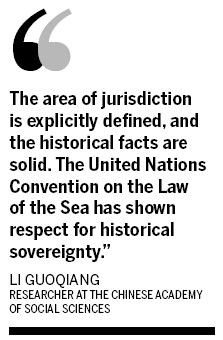A Chinese expert has responded to statements from Washington and Manila that challenged Beijing's territorial sovereignty in the South China Sea, calling on the international community to respect historical evidence instead of adding to regional tensions.
Li Guoqiang, a Southeast Asian studies researcher at the Chinese Academy of Social Sciences, said on Thursday that China's presence in and exploration of the South China Sea dates back 2,000 years.
With tensions already high after China introduced its air defense zone over the East China Sea last year, a United States diplomat said on Wednesday that China must clarify or adjust its claims of sovereignty in the South China Sea.
On Tuesday, Philippine President Benigno Aquino compared China to Nazi Germany in an interview with The New York Times. Aquino said Manila now faces a challenge to surrender territory to a much stronger foreign power.
Li said that until 2009 no country had challenged China's de facto control over the "nine-dash line" that outlines its territory in the South China Sea.
"The area of jurisdiction is explicitly defined, and the historical facts are solid. The United Nations Convention on the Law of the Sea has shown respect for historical sovereignty," he said.
Danny Russel, US assistant secretary of state for East Asian and Pacific affairs, in challenging China's "nine-dash line", said on Wednesday that territorial claims within international laws must be based on land features.
"China's lack of clarity with regard to its South China Sea claims has created uncertainty in the region and limits the prospect for achieving mutually agreeable resolution or equitable joint development arrangements," Russel said.

Li said Russel's criticism is aimed at securing the US presence in the region as it actively implements its strategic pivot to Asia.
Russel also warned China on Tuesday that the US does not recognize or accept China's Air Defense Identification Zone over the South China Sea.
"We made clear to China that it shouldn't attempt to implement that ADIZ and should refrain from taking similar actions elsewhere in the region," he said.
Foreign Ministry spokesman Hong Lei responded on Tuesday that China has not seen any threat to air security from member countries of the Association of Southeast Asian Nations. He also said he is optimistic about China's relations with neighboring countries in the South China Sea and the overall situation in the region.
"Washington has been consistent in opposing China's establishment of the zone, but it has recently raised the tone of its criticism because it fears that China's increasing activities in the region may impair its vested interests," Li said.
In the interview with The New York Times, Aquino asked world leaders not to make the mistake of appeasing China regarding South China Sea disputes. He then made a reference to the West's failure to support Czechoslovakia in 1938 when Adolf Hitler's Nazi Germany occupied the western parts of the European nation before World War II.
"The world has to say it - remember that the Sudetenland was given in an attempt to appease Hitler to prevent World War II," Aquino said. "At what point do you say: Enough is enough?"
Aquino's comments sparked anger in Chinese media. On Wednesday, Xinhua News Agency lashed out at Aquino as "an amateurish politician who was ignorant both of history and reality".
Xinhua, in its commentary, said Aquino, "who has taken an inflammatory approach while dealing with maritime disputes with China, has never been a great candidate for a wise statesman in the region".
Aquino's remarks came weeks after Japanese Prime Minister Shinzo Abe, during a speech at the World Economic Forum in Davos, Switzerland, in January, compared Japan-China relations to the rivalry between Britain and Germany before World War I.
"Abe and Aquino are attempting to garner support and isolate China on the international level," said Chen Qinghong, a researcher on Philippine studies with the China Institutes of Contemporary International Relations.
Manila claimed on Wednesday that Aquino was citing historical fact in The New York Times interview and was not trying to offend China or "add fuel to the fire".
AFP contributed to this story.
puzhendong@chinadaily.com.cn
(China Daily 02/07/2014 page11)